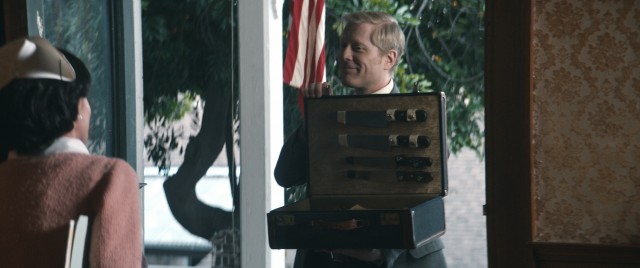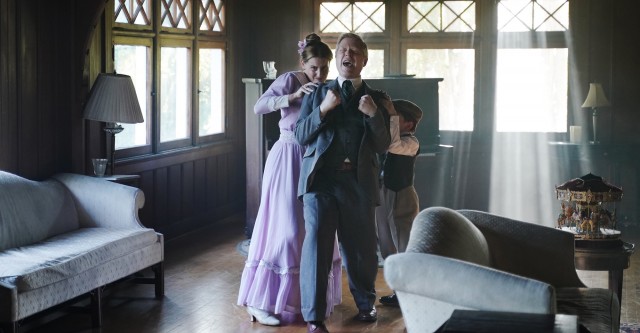Writer/director Jacob Chase describes his latest short film Trouble as a musical thriller, which as a genre is quite intriguing in itself. How can one combine the over-the-top earnest kitsch of characters breaking into song with the suspense of deceit and murder? Trouble answers that question.
“The best musicals are ones that demand to be musicals”
Trouble starts out innocently enough, set in a suburban scene in 1952, we follow an old-fashioned door-to-door salesman as he’s let into a mansion by the owner’s unwitting caretaker, who wants to take the opportunity to visit another patient for a few minutes. The worst thing that could happen is that the man of the house buys a few overpriced kitchen knives, right? What else could possibly go wrong? At first, the salesman (Anthony Rapp) comes across as clumsy and unknowing, while the old man (John Rubinstein) gives off a grumpy, intimidating vibe. The table seems set, before it turns when the young man starts to sing.
Without giving too much away, summarizing musicals always feels a bit silly, since the magic more often than not is found in the execution instead of the plot. As writer/director Chase describes himself: “To me, the best musicals are ones that demand to be musicals. The story wouldn’t work without the songs and vice versa.“
It is one of the most remarkable aspects of the film to see how Chase swings for the fences with an idea that is extremely difficult to pull off. Managing to stay on the right side of ludicrousness, you can sense the possibility that the entire concept could have gone off the rails in the hands of a less dedicated filmmaker.

Anthony Rapp as the door-to-door salesman at the heart of Jacob Chase’s Trouble
The filmmaker’s ambition speaks to his talents as a technical and narrative craftsman who is not afraid to try something new in his career. In a previous interview with the filmmaker, I posted the thesis that his career is molded after none other than Steven Spielberg, a director who has tackled various genres and styles in order to push himself as a storyteller. That comparison was supported by the fact that Spielberg executive produced Chase’s horror feature Come Play, but when you look at Trouble and compare it to Chase’s previous shorts (Amy, Larry), it proves that the filmmaker has already honed a diversified range in his oeuvre.
Although it feels like quite the diversion, the decision to make a short musical for his next film was quite deliberate. “I primarily work in the horror genre at the moment, but my truest passion is musical theater,” Chase says. “Musical theater was my introduction to storytelling, and I’ve long wanted to bring my own singing and dancing characters to the screen.“ Bearing this in mind, Chase was aware of the challenges that Trouble presented, which he ultimately used to his advantage.
“Both genres make me feel like I’m in conversation with the audience as a filmmaker”
“I realize ‘musical’ and ‘suspense’ aren’t two words often associated, but I believe they share some key traits,” Chase admits. “Both genres require an open audience, willing to engage with the heightened form. Both the suspense of a great scare sequence, and the dancing in a kick-ass dance sequence, can make audiences cheer. And both genres make me feel like I’m in conversation with the audience as a filmmaker.“
At times, Trouble seems like the musical answer to the proof-of-concept film, which is usually more dominant in the science-fiction or horror genres, but its inception speaks to the power and advantages of the short film medium. The confined space and runtime constitute the parameters that make it possible for Trouble to work the way it was intended. When you’ve watched the film, you realize that additional story elements before or after the central conflict would have spoiled what is special about its core gimmick.

“My goal was to use my horror roots to build a naturalistic tone with tension that constantly rises and a singing style that feels like it springs organically out of the emotion” – Chase on his aims for Trouble
When we discussed the film within the S/W team, editor-in-chief Jason Sondhi pointedly remarked about Trouble that: “Even with our IP-dominant entertainment landscape, pitching a dark Music Man sequel is still pretty out there.“ Although I have to admit that I didn’t know the Broadway musical or its 1962 Hollywood adaptation, the viewing experience works without this reference. The twist on the aforementioned classic was definitely on the director’s mind when he came up with the idea for the film though: “I wanted to re-examine a classic character from musical theater through the eyes of a character who may have been affected by his actions more than we realized.“
For all the musical fans out there, the casting itself is a bow to the form. The traveling salesman is played by Anthony Rapp, who originated the role of Mark Cohen in the Broadway production of the pathbreaking show Rent. Acting opposite him as the old man is John Rubinstein, who played Pippin in Bob Fosse’s staging of the musical of the same name.
What additionally stands out in Trouble is its technical virtuosity, particularly Florian Stadler’s cinematography and the choreography by Sean Lew, both of which are essential in drawing viewers into the story. “I wanted to create a cast full of people from the musical world, while also infusing a modern sensibility,” Chase reveals. Adding that it was also important to him for “the film to feel choreographed from the jump, so when the singing starts, we don’t feel like we’re going into a music video. So a lot of thought went into making everything feel natural and of a consistent style. That includes having Anthony sing live on set much of the time.“
Looking back on our interview with Jacob Chase from 2020 and the review of Larry, I realized that the filmmaker has been working on a musical murder mystery pilot for quite some time, which he consequently developed at the Sundance Episodic Lab and which was subsequently sold to ABC. Unfortunately, the show never got made in the end, but Chase stuck with the idea of making a musical, which led him to come up with this new and personal short film, an opportunity to turn his passion into reality on his own terms.

 Georg Csarmann
Georg Csarmann